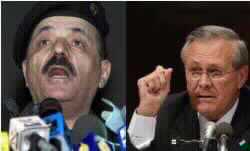US Pushes War Option as Saddam Gets Key Support in Iraq
23/09/2002| IslamWeb
 President George W. Bush can count on broad support from the US Congress as he mulls plans for attacking Iraq regardless of what the United Nations decides, key lawmakers said, while defiant Iraqi leader Saddam Hussein picked up backing from Shiite religious leaders. Senator John McCain told NBC television he expects the United States to go to war against Iraq as he and other Republicans said they expect overwhelming support for military action in the Congress.
President George W. Bush can count on broad support from the US Congress as he mulls plans for attacking Iraq regardless of what the United Nations decides, key lawmakers said, while defiant Iraqi leader Saddam Hussein picked up backing from Shiite religious leaders. Senator John McCain told NBC television he expects the United States to go to war against Iraq as he and other Republicans said they expect overwhelming support for military action in the Congress.
But Carl Levin, the Democratic chair of the Senate's Armed Services Committee, disagreed, saying that in its current form, the resolution would not pass.
Meanwhile, Bush was weighing military options against Iraq that focused on Saddam Hussein and his inner circle rather than a general assault.
US military planners have already begun choosing targets for US warplanes and missiles, the size and shape of the troop deployments on the ground and a likely timeline for a US invasion, the Washington Post reported.
The US invasion force would likely amount to more than 100,000 troops -- much smaller than the 500,000 deployed in the Gulf war in 1991, the Post said, relying on special operations forces and a simultaneous ground and air assault.
Based on dozens of interviews with people inside and outside the administration, the Post said the war would likely target Tikrit, Saddam's hometown, which is seen as the political heart of the country.
In Warsaw, arriving for a NATO meeting, US Defense Secretary Donald Rumsfeld said the reports on US war plans "are saying the obvious.
Bush asked Congress for sweeping authority to act against Iraq, even as Washington pushes the United Nations for a tough new resolution on arms inspections, rejecting Baghdad's acceptance of the inspectors' return.
His apparent determination to proceed regardless of how the world body responds has sparked fresh defiance from Baghdad, a chorus of anger from Arab leaders and alarm within the British government.
In Iraq, Vice President Taha Yassin Ramadan said the United Nations should not serve as a platform for a US military attack.
Meanwhile, Shiite leaders in the southern Muslim holy city of Najaf issued two religious decrees calling on Muslims to defend Iraq in the face of a potential US military attack.
"The duty of Muslims in these difficult circumstances is to unify their position and deploy all means to defend Iraq and protect it from enemy designs," Imam Ali Hussein al-Sistani said in one decree, known as a fatwa.
A second fatwa issued by prominent Imam Mohammad Said Al-Hakim warned against "any kind of cooperation with the United States" and attacked "all those who would broker a truce with the Americans.
In London, Washington's main ally, British Prime Minister Tony Blair, came under pressure from his own cabinet to tread a more cautious line as he prepared to publish a 50-page document -- to coincide with a special parliamentary debate Tuesday on Iraq -- that government sources say will confirm the Iraqi president has nuclear, biological and chemical weapons.
Continued US talk of war also prompted criticism from Arab countries such as Kuwait, whose invasion by Iraq in 1990 led to the Gulf War.
Kuwaiti Defense Minister Sheikh Jaber Mubarak al-Sabah told his country's Al-Watan newspaper the United States could not use his emirate as a springboard to attack Iraq without UN authority.
Turkey, a Muslim ally of the United States with key military bases that would be useful in an attack, also reiterated its opposition to any war without a UN mandate.
PHOTO CAPTION
(L) Iraq's Vice President Taha Yassin Ramadan speaks at the opening ceremony of the Babylon International Festival, September 22, 2002. Iraq said on Sunday its decision to reject any new U.N. Security Council resolution was not defiance but a logical view, shared by the majority of council members. REUTERS/Akram Salih
- Sep 22 4:47 PM ET
(R ) U.S. Defense Secretary Donald Rumsfeld suggested September 22, 2002 that any American invasion of Iraq would directly target Baghdad's 'dictatorial, repressive' government while attempting to spare the Iraqi people. (Hyungwon Kang/Reuters)
- Sep 22 7:33 PM
www.islamweb.net
